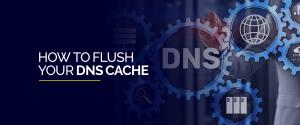

Get 93% OFF on Lifetime
Exclusive Deal
Don’t miss out this deal, it comes with Password Manager FREE of cost.
Get 93% off on FastestVPN and avail PassHulk Password Manager FREE
Get This Deal Now!By Nick Anderson No Comments 4 minutes
DNS issues can cause your internet experience to break. You may face issues where web pages would fail to load. If it’s happening to you, it could be a sign of a DNS cache issue. Knowing how to flush DNS cache gets rid of the problem. But what is DNS, and why is it so important? We’ll talk about that and more.

DNS serves as the address book for the internet. Much like how phonebooks were referred to for looking up the right number, DNS services provide similar functionality for the World Wide Web.
Every device in the world that wants to access the internet uses an IP address to communicate with other devices on the internet. An IP address is a unique string on numeric/alphanumeric numbers that makes it possible for devices to reach the correct destination. All websites are run on servers, and those servers have an IP address.
Instead of writing the IP address, we can write domain names like fastestvpn.com, and the DNS will look up the corresponding IP address and return that address. Internet Service Providers (ISP).
The DNS lookup process can be long. When the DNS resolver returns the address, the web browser saves that information for a faster experience. It does that for websites that you have already visited. Ever felt how new websites load up faster on the second visit? That’s because the browser has cached the website.
A problem arises if certain things happen, such as when a website has changed servers. The new servers will have a different IP address – but the domain name will remain the same. The OS will refer to its DNS cache for the domain name and revisit the address, which is no longer valid.
Another scenario is if malware has infected your system and begins redirecting you to malicious websites. These may include redirects you to a different search engine than the one you try to access or redirects to a different social media chat application.
This isn’t the same thing as clearing the browser history and on your web browser. There is a different approach to flushing DNS cache. Just as you would expect to hide your browsing history from others who may use the system, clearing the DNS cache adds to your privacy. The cache can be potentially looked into to determine your browsing history.
Flushing DNS cache takes only a couple of seconds and is different for each platform. We’ll walk you through all the platforms.
The DNS cache should be cleared now.
By default, Ubuntu does not cache DNS. But you may install a DNS service that would require a wipe.
Connecting to VPN allows you to bypass the ISP for DNS queries. Internet traffic is encrypted, then sent to the VPN server through the ISP, acting as a gateway to the internet. The ISP does not know what’s in the data packet or the ultimate destination, only that you are communicating with a particular destination (the VPN server).
The encryption aspect of a VPN delivers solid security, such as on public Wi-Fi hotspots that are generally unsecured and vulnerable to threats. It is what gives you privacy on the web. You can browse the web knowing that your activity is not being monitored or logged.
While you are at it, learn what is an IP address in our blog here. It will explain why DNS and an IP address are important and how hiding them can make web access private for you.
© Copyright 2024 Fastest VPN - All Rights Reserved.


Don’t miss out this deal, it comes with Password Manager FREE of cost.
This website uses cookies so that we can provide you with the best user experience possible. Cookie information is stored in your browser and performs functions such as recognising you when you return to our website and helping our team to understand which sections of the website you find most interesting and useful.
Strictly Necessary Cookie should be enabled at all times so that we can save your preferences for cookie settings.
If you disable this cookie, we will not be able to save your preferences. This means that every time you visit this website you will need to enable or disable cookies again.


